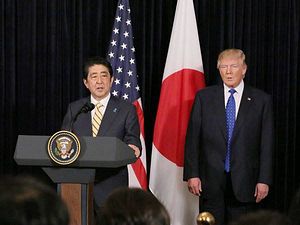Trump’s actions on his trip to Europe—not affirming NATO’s Article 5 guarantee of collective security, picking fights with Germany’s leadership, shoving the Montenegrin prime minister out of his way, and more—went poorly enough, but maybe worse is the fact that European leaders can score domestic points by overtly breaking with Trump.
Angela Merkel’s comments at a campaign event in Bavaria where she overtly expressed distrust with United States were notable less because of their geopolitical implications and more because breaking with Trump has domestic benefits for leaders of industrialized liberal democracies. European leaders are already trolling Trump and mainstream political leaders can use their opposition to Trump and what he represents to help secure their domestic political base.
Except in Japan. In contrast with Merkel and French President Emanuel Macron, Prime Minister Shinzo Abe has sought out—and so far enjoyed—a close personal relationship with Trump, visiting him at Trump Tower just weeks after Trump’s election, enjoying golf at Mar-a-Lago, and speaking on the phone fairly regularly. Abe’s charm offensive has apparently been so successful that Trump once asked a room full of House members why can’t they be more like Abe.
So what’s the difference? Basically, Japan doesn’t have much choice. Without an armed force independently capable of deterring Chinese maritime incursions into Japanese waters or North Korea’s nuclear program, and given that acquiring such a force is unconstitutional and prohibitively expensive, Japan has no option but to rely on the U.S. security guarantee in at least the short-to-medium term. Economically, the United States is Japan’s largest trading partner and integrating the two economies remains a goal for Japan while basic nostalgia maintains a strong pull.
Domestically, Japanese voters (and business) have no love for Trump, but with given that Japan’s opposition poses almost no threat to Abe, there’s little domestic political incentive for him to distance himself from Trump. But there are significant incentives—commercial, security, and more— to maintain a strong relationship with the United States. And given how aggressively Trump attacked Japan’s monetary policy, the security relationship, and the trade deficit, there were real concerns that Trump would dramatically, unilaterally alter the relationship and leave Japan isolated.
To prevent that, the bureaucrats in the Foreign Ministry and Prime Minister’s office determined a strategy for dealing with Trump: maintain a good personal relationship at the top and deal with the practical issues the levels below that. The U.S.-Japan Economic Dialogue would be a good example of that strategy.
At the same time, Japan is quietly hedging by strengthening its regional alliances and exploring the possibility of a preemptive capability against North Korean missiles. How far this could go on the military side is limited because of legal restrictions, cost issues, and public skepticism, but on the trade side (including the arms trade), Japan has been much more proactive.
Abe has not closed the door on U.S. participation in the Trans-Pacific Partnership (which is unlikely for the duration of the Trump administration, but given how quickly Trump changed his position on NAFTA following phone calls from the leaders of Canada and Mexico it’s certainly worth trying), but has worked to advance TPP among the agreement’s remaining 11 members in the meantime.
Almost immediately before Trump’s inauguration in January, Abe toured four states in Southeast Asia (Australia, Indonesia, the Philippines, and Vietnam), where he made several promises of investment and aid along with commitments to regional integration and development. The idea being that if the Trump administration withdraws from its commitments to East Asia, deepening its relationship with its neighbors will help Japan and the region become more self-reliant in the face of an aggressively assertive China (South Korea remains a glaring exception to this outreach).
So Japan is doing something close to what Merkel told her audience in Bavaria, but in its own quiet way while still trying to maximize its gains from its bilateral relationship with the United States. It’s a good illustration of the constant tension between autonomy and entrapment in Japanese foreign policy—stray too far from the United States and lose its security umbrella and undermine its closest alliance, but stay too close and risk overcommitting or losing its independence over its foreign and security policy.
So far Japan has balanced this well in its relationship with Trump, but future success is by no means guaranteed—China’s Xi Jinping seems equally adroit as Abe at winning Trump’s ear, and Trump’s mercurial nature will mean that staying in his good graces (especially in competition with China) will require constant effort. Additionally, practical issues like monetary policy and the trade deficit will not be easily solved, never mind more perennial issues like U.S. bases in Okinawa and trade liberalization.
Instead, the goal is largely the status quo—maintain U.S. deterrence against China and North Korea, prevent conflagrations if possible, and keep the bilateral economic relationship from getting hung up on currency issues and the trade deficit. Whether they like him or not, antagonizing Trump won’t help Japan do any of that.
Paul Nadeau is a private secretary working for the Japanese Diet, as well as an adjunct fellow at the Center for Strategic and International Studies.

































